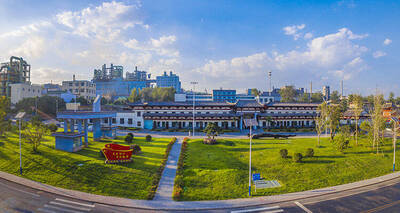《TAIPEI TIMES》US seizes hair weaves from Xinjiang camps

A handout photograph from the US Customs and Border Protection (CBP) Office of Public Affairs taken on Monday shows a CBP officer at the Port of New York/Newark inspecting a shipment of hair pieces and accessories from China, part of which is suspected to have been made with forced or prison labor in contravention of US law. Photo: AFP / US Customs and Border Protection Office of Public Affairs
FORCED LABOR: Customs officials have seized a 11.8 tonne shipment of products made from human hair on suspicion they were produced by people facing human rights abuses
/ AP
Federal authorities in New York City on Wednesday seized a shipment of weaves and other beauty accessories suspected to be made out of human hair taken from people locked inside a Chinese internment camp.
US Customs and Border Protection (CPB) officials said that 11.8 tonnes of hair products worth an estimated US$800,000 were in the shipment.
“The production of these goods constitutes a very serious human rights violation, and the detention order is intended to send a clear and direct message to all entities seeking to do business with the United States that illicit and inhumane practices will not be tolerated in US supply chains,” said Brenda Smith, executive assistant commissioner of CBP’s Office of Trade.
This is the second time this year that CBP has slapped one of its rare detention orders on shipments of hair weaves from China, based on suspicions that people making them face human rights abuses.
The orders are used to hold shipping containers at US ports of entry until the agency can investigate claims of wrongdoing.
Uighur American advocate Rushan Abbas, whose sister, a physician, went missing in China almost two years ago and is believed to be locked in a detention camp, said women who use hair weaves should think about who might be making them.
“This is so heartbreaking for us,” she said. “I want people to think about the slavery people are experiencing today. My sister is sitting somewhere being forced to make what, hair pieces?”
Wednesday’s shipment was made by Lop County Meixin Hair Product Co. In May, a similar detention was placed on Hetian Haolin Hair Accessories Co, although those weaves were synthetic, not human, the agency said.
Hetian Haolin’s products were imported by Os Hair in Duluth, Georgia, and I & I Hair, headquartered in Dallas, Texas. I & I’s weaves are sold under the Innocence brand to salons and individuals around the US.
Both exporters are in Xinjiang, where, over the past four years, the government has detained an estimated 1 million or more ethnic Turkic minorities in internment camps and prisons, where they are subjected to ideological discipline, forced to denounce their religion and language, and physically abused.
Reports by The Associated Press and other news organizations have repeatedly found that people inside the internment camps and prisons, which activists call “black factories,” are making sportswear and other apparel for popular US brands.
The AP tried to visit Hetian Haolin Hair Accessories Co more than a year ago during an investigation into forced labor inside the camps, but police called the cab driver taking journalists to the area, ordering the driver to turn back and warning that the cab’s coordinates were being tracked.
From the road, it was clear the factory — topped with “Haolin Hair Accessories” in big red letters — was ringed with barbed wire fencing and surveillance cameras, and the entrance was blocked by helmeted police.
Across the street, what appeared to be an educational facility was topped with political slogans declaring “the country has power” and urging people to obey the Chinese Communist Party.
It was unclear whether the factory was part of a detention center, but former detainees in other parts of Xinjiang have described being shuttled to work in fenced, guarded compounds during the day and taken back to internment camps at night.
The Chinese Ministry of Affairs has said there is no forced labor, nor detention of ethnic minorities.
“We hope that certain people in the United States can take off their tinted glasses, correctly understand and objectively and rationally view normal economic and trade cooperation between Chinese and American enterprises,” the ministry said in a statement.
The CPB announcement came as the US departments of state, commerce, treasury and homeland security warned US businesses to beware importing goods through supply chains that involve forced or prison labor in Xinjiang and elsewhere in China.
They also warned companies against supplying surveillance tools to be used by authorities in Xinjiang, or aiding in the construction of facilities used in the mass detention of Muslims and minorities in the province.
The Chinese government “continues to carry out a campaign of repression in Xinjiang, targeting Uighurs, ethnic Kazakhs, ethnic Kyrgyz, and members of other Muslim minority groups,” the State Department said.
Businesses that expose themselves to this “should be aware of the reputational, economic, and legal risks,” they said.
Xinjiang authorities in December last year announced that the camps had closed and all the detainees had “graduated,” a claim difficult to corroborate independently given tight surveillance and restrictions on reporting in the region.
Some Uighurs and Kazakhs have told reporters that their relatives have been released, but many others say their loved ones remain in detention, were sentenced to prison or transferred to forced labor in factories.
While tariffs and embargoes over political issues are fairly common, it is extremely rare for the US government to block imports produced by forced labor.
The 1930 Tariff Act prohibited those imports, but the government has only enforced the law 54 times in the past 90 years.
Most of those bans, 75 percent, blocked goods from China, and enforcement has ramped up since then-US president Barack Obama strengthened the law in 2016.
US Representative Chris Smith said that while the allegations of forced labor are appalling, “sadly they are not surprising.”
“It is likely that many slave labor products continue to surreptitiously make it into our stores,” said Smith, who has taken a lead on anti-human trafficking legislation.
US President Donald Trump on June 17 signed the bipartisan Uyghur Human Rights Policy Act of 2020, condemning “gross human rights violations of specified ethnic Muslim minority groups in the Xinjiang region in China.”
“President Trump has been very clear when he signed this bill ... that we were going to take this seriously, we were going to deal with it, we were going to put harsh restrictions in place,” US Secretary of State Mike Pompeo said on Wednesday in an interview on Fox News.
Additional reporting by AFP
新聞來源:TAIPEI TIMES



















